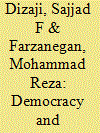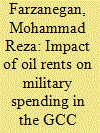|
|
|
Sort Order |
|
|
|
Items / Page
|
|
|
|
|
|
|
| Srl | Item |
| 1 |
ID:
189400


|
|
|
|
|
| Summary/Abstract |
This study examines the dynamic relationship between democracy and the military in more than 40 developing countries from 1990 to 2017. We investigate the dynamic interaction between democracy and military institutions using a panel vector autoregressive model and impulse response functions as well as variance decomposition analyses. We show that democracy plays a significant role in the substitution of nonmilitary expenditures for defense expenditures. We also investigate the response of democracy to positive shocks in military and nonmilitary expenditures. We find that the responses of political systems and different indexes of democracy including electoral, liberal, participatory, deliberative, and egalitarian democracy to positive shocks in military expenditures are negative and significant, whereas their responses to the shocks in nonmilitary expenditures are not significant. This result suggests that the political behavior of governments in developing countries is influenced more heavily by their spending on the military sector than by their spending on the nonmilitary sector.
|
|
|
|
|
|
|
|
|
|
|
|
|
|
|
|
| 2 |
ID:
184051


|
|
|
|
|
| Summary/Abstract |
This study estimates the joint effect of a new political regime and war against Iraq, on Iran’s per capita Gross Domestic Product (‘GDP,’ constant 2010 US$) for the period 1978–1988, during the revolution/war. I use a synthetic control approach, whereby a synthetic Iran is constructed as a weighted average of other Middle East and North Africa (‘MENA’)/Organization of the Petroleum Exporting (‘OPEC’) countries to match the average level of some key per capita GDP correlates over the period 1970–1977 as well as the evolution of the actual Iranian per capita GDP during that period. I find a sizable negative effect of the joint treatment. The average Iranian lost an accumulated sum of approximately US$ 34,660 during 1978–1988 (i.e. the average annual real per capita income loss of US$ 3,150). This loss equals 40% of the real income per capita, which an Iranian could earn in the absence of revolution and war. The confidence sets based on constant, linear, and uniform assumptions of treatment effect show that estimated income loss for Iran is sizeable and statistically significant. The results remain robust to a set of placebo tests.
|
|
|
|
|
|
|
|
|
|
|
|
|
|
|
|
| 3 |
ID:
187351


|
|
|
|
|
| Summary/Abstract |
I use the synthetic control method to estimate the effect of international banking and energy sanctions from 2012 to 2015 on Iran’s military spending. I created a counterfactual Iran, a synthetic control group, that mimics the socioeconomic characteristics of Iran before the international sanctions of 2012. Then I compare the military spending of the counterfactual Iran without sanctions to the factual Iran with sanctions for the period of 2003–2015. Over the entire 2013–2015 period, per capita military spending was reduced by approximately 117 US$ per year on average. The main findings are robust to a series of tests, including placebo tests. Estimated confidence sets show that the decrease in Iran’s military spending after the 2012 sanctions is also statistically significant.
|
|
|
|
|
|
|
|
|
|
|
|
|
|
|
|
| 4 |
ID:
163239


|
|
|
|
|
| Summary/Abstract |
This study shows how the level of corruption matters in the way oil rents affect a state's military spending. Using panel data covering the 1984–2014 period for the Gulf Cooperation Countries (GCC), we find that the effect of oil rents on military budgets depends on the extent of political corruption. Oil rents are negatively associated with military spending of the GCC countries. However this, in turn, is moderated by higher levels of corruption. For comparison, we examine this association in non-GCC countries in the MENA region, finding a positive effect of higher oil rents on military spending: this effect is larger in corrupt polities within non-GCC countries. The intermediary role of corruption in the military-oil nexus is robust, controlling for a set of variables that may affect military spending.
|
|
|
|
|
|
|
|
|
|
|
|
|
|
|
|
| 5 |
ID:
129827


|
|
|
|
|
| Publication |
2014.
|
| Summary/Abstract |
Over the last decade, the Iranian Government budget on military has been higher than the average of the world. The current increasing international sanctions aim to reduce the military capabilities and capacities of the Iranian Government. We analyze the response of the Iranian economy to shocks in its military budget from 1959 to 2007, using impulse response functions and variance decomposition analysis. The Granger causality results show that there is unidirectional causality from the military spending growth rate to the economic growth rate. The response of income growth to increasing shocks in the military budget is positive and statistically significant.
|
|
|
|
|
|
|
|
|
|
|
|
|
|
|
|
| 6 |
ID:
142042


|
|
|
|
|
| Summary/Abstract |
We study the association between natural resource rents and internal political stability, highlighting the importance of the distribution of political power as a mediating factor. We present a simple theoretical model demonstrating that increased rents are likely to be positively associated with the internal stability of a powerful incumbent while destabilizing a less powerful incumbent. Our empirical analysis confirms this prediction. Employing panel data for more than 120 countries from the period 1984–2009, our estimation results demonstrate that resource rents can promote political stability but only when political power is sufficiently concentrated. Indeed, if the incumbent is sufficiently weak, rents fuel instability. Our main results hold when we control for the effects of income, quality of institutions (rule of law, democratic accountability and corruption), persistence of political stability, time-varying common shocks, country fixed effects, possible endogeneity of rents and power balance to political stability, and various additional covariates. Our analysis departs from the existing literature by emphasizing not (only) the type of government, but rather the strength of government, as a key determinant of the impact of resource rents on political stability. This analysis sheds light on current political transformations and reconfigurations in the resource rich Middle East and North Africa.
|
|
|
|
|
|
|
|
|
|
|
|
|
|
|
|
| 7 |
ID:
142043


|
|
|
|
|
| Summary/Abstract |
We study the association between natural resource rents and internal political stability, highlighting the importance of the distribution of political power as a mediating factor. We present a simple theoretical model demonstrating that increased rents are likely to be positively associated with the internal stability of a powerful incumbent while destabilizing a less powerful incumbent. Our empirical analysis confirms this prediction. Employing panel data for more than 120 countries from the period 1984–2009, our estimation results demonstrate that resource rents can promote political stability but only when political power is sufficiently concentrated. Indeed, if the incumbent is sufficiently weak, rents fuel instability. Our main results hold when we control for the effects of income, quality of institutions (rule of law, democratic accountability and corruption), persistence of political stability, time-varying common shocks, country fixed effects, possible endogeneity of rents and power balance to political stability, and various additional covariates. Our analysis departs from the existing literature by emphasizing not (only) the type of government, but rather the strength of government, as a key determinant of the impact of resource rents on political stability. This analysis sheds light on current political transformations and reconfigurations in the resource rich Middle East and North Africa.
|
|
|
|
|
|
|
|
|
|
|
|
|
|
|
|
|
|
|
|
|